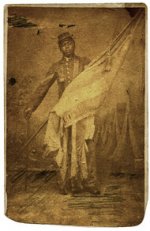jazzeum
Four Star General
- Joined
- Apr 23, 2005
- Messages
- 38,439
On July 18, 1863, the 54th Massachusetts Infantry’s attempted to storm Fort Wagner, South Carolina and suffered 45 percent casualties in its futile frontal assault. The 54th Massachusetts was a unit raised by Gov. John Andrew of Massachusetts, an abolitionist. It consisted of men from all over the United States, not just Massachusetts. It was primarily made up of free men who had never been slaves. It was the first black military unit raised in the North. Although the 54th Massachusetts did not win in strictly military terms , they won a costly moral victory by showing that black men would fight and die as bravely of white men in similarly adverse circumstances, when detractors had long claimed African Americans could not be trained as soldiers and would flee from the battlefield at the first hint of danger.
The 54th Massachusetts was led by Colonel Robert Shaw, who died leading his men on the assault. Shaw and his men were buried unceremoniously by being tossed in a burial trench. After the war, his family refused to have his bodied removed from this trench.
![fort-wagner-3[1].jpg fort-wagner-3[1].jpg](https://forum.treefrogtreasures.com/data/attachments/103/103341-ff229e2d38dcafd25db5fdef4761d4a0.jpg)
![fort-wagner-6[1].jpg fort-wagner-6[1].jpg](https://forum.treefrogtreasures.com/data/attachments/103/103342-cd27d70024a506e8343985ed6ccc2763.jpg)
“Storming Ft. Wagner” (1890), Kurz & Allison Art Publishers
![colonel-shaw[1].jpg colonel-shaw[1].jpg](https://forum.treefrogtreasures.com/data/attachments/103/103343-b64f624aa284ea1512f9d9f35335bd9b.jpg)
Colonel Shaw (from April 15, 1863 edition of Harper's Weekly)
![Memorial_to_Robert_Gould_Shaw_and_the_54th_Massachusetts_Volunteer_Infantry_Regiment,_Boston[1].jpg Memorial_to_Robert_Gould_Shaw_and_the_54th_Massachusetts_Volunteer_Infantry_Regiment,_Boston[1].jpg](https://forum.treefrogtreasures.com/data/attachments/103/103344-97d79603e37805cacb9574e5c8823e88.jpg)
Memorial to Robert Gould Shaw and the Massachusetts Fifty-Fourth Regiment by Augustus Saint-Gaudens. The sculpture depicts the 54th Regiment marching down Beacon Street in Boston on May 28, 1863.
The 54th Massachusetts was led by Colonel Robert Shaw, who died leading his men on the assault. Shaw and his men were buried unceremoniously by being tossed in a burial trench. After the war, his family refused to have his bodied removed from this trench.
![fort-wagner-3[1].jpg fort-wagner-3[1].jpg](https://forum.treefrogtreasures.com/data/attachments/103/103341-ff229e2d38dcafd25db5fdef4761d4a0.jpg)
![fort-wagner-6[1].jpg fort-wagner-6[1].jpg](https://forum.treefrogtreasures.com/data/attachments/103/103342-cd27d70024a506e8343985ed6ccc2763.jpg)
“Storming Ft. Wagner” (1890), Kurz & Allison Art Publishers
![colonel-shaw[1].jpg colonel-shaw[1].jpg](https://forum.treefrogtreasures.com/data/attachments/103/103343-b64f624aa284ea1512f9d9f35335bd9b.jpg)
Colonel Shaw (from April 15, 1863 edition of Harper's Weekly)
![Memorial_to_Robert_Gould_Shaw_and_the_54th_Massachusetts_Volunteer_Infantry_Regiment,_Boston[1].jpg Memorial_to_Robert_Gould_Shaw_and_the_54th_Massachusetts_Volunteer_Infantry_Regiment,_Boston[1].jpg](https://forum.treefrogtreasures.com/data/attachments/103/103344-97d79603e37805cacb9574e5c8823e88.jpg)
Memorial to Robert Gould Shaw and the Massachusetts Fifty-Fourth Regiment by Augustus Saint-Gaudens. The sculpture depicts the 54th Regiment marching down Beacon Street in Boston on May 28, 1863.
Last edited:


